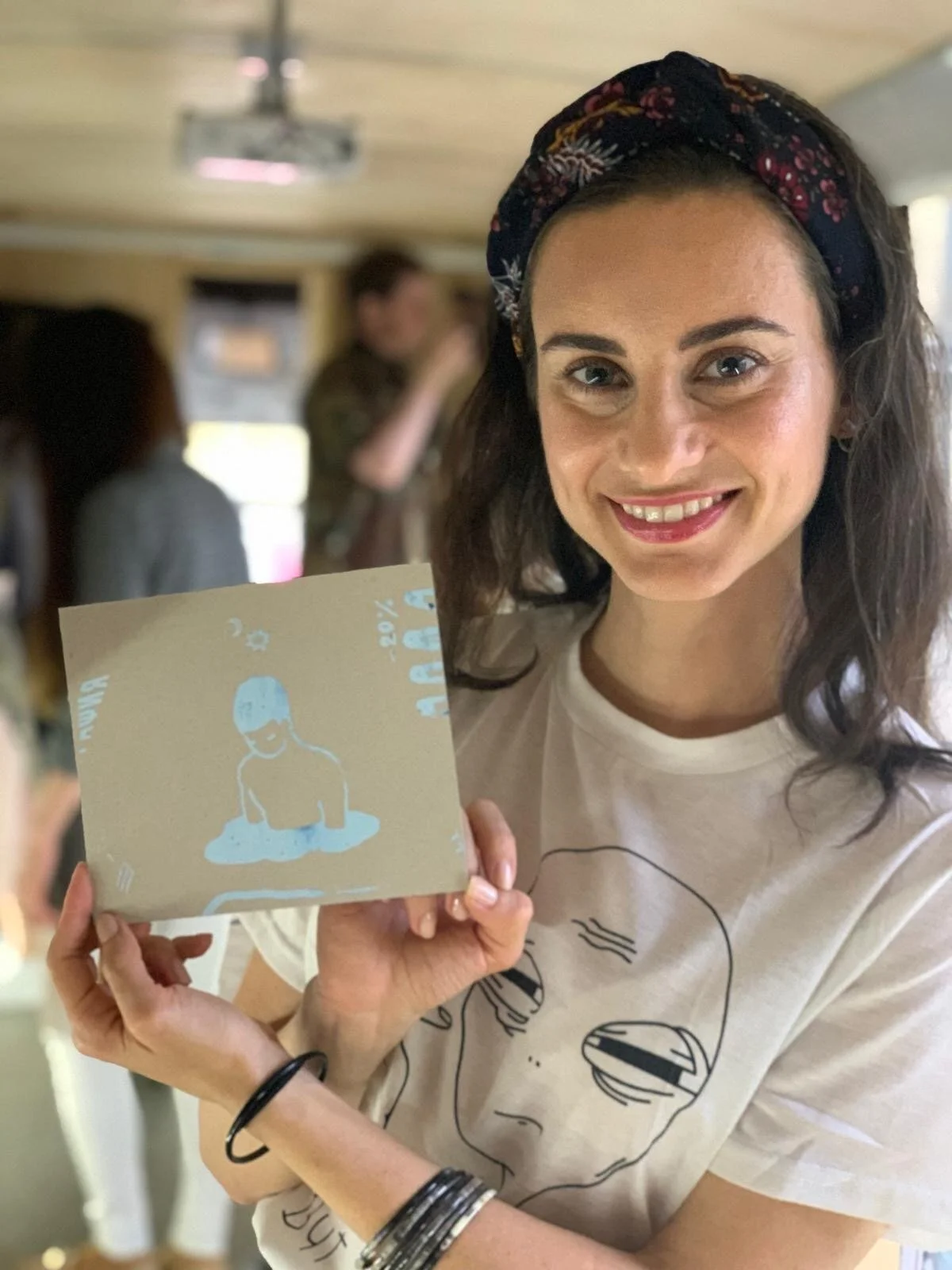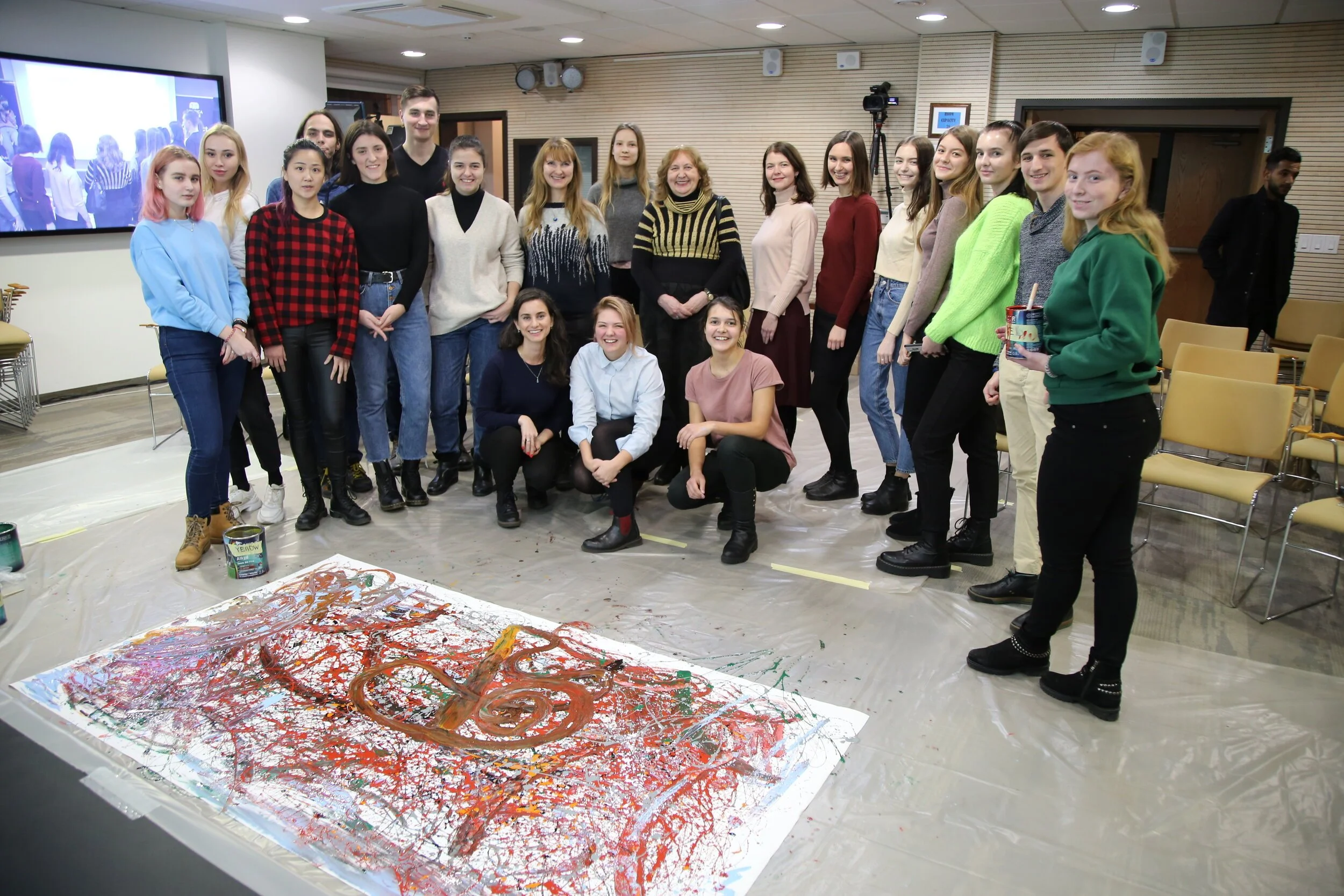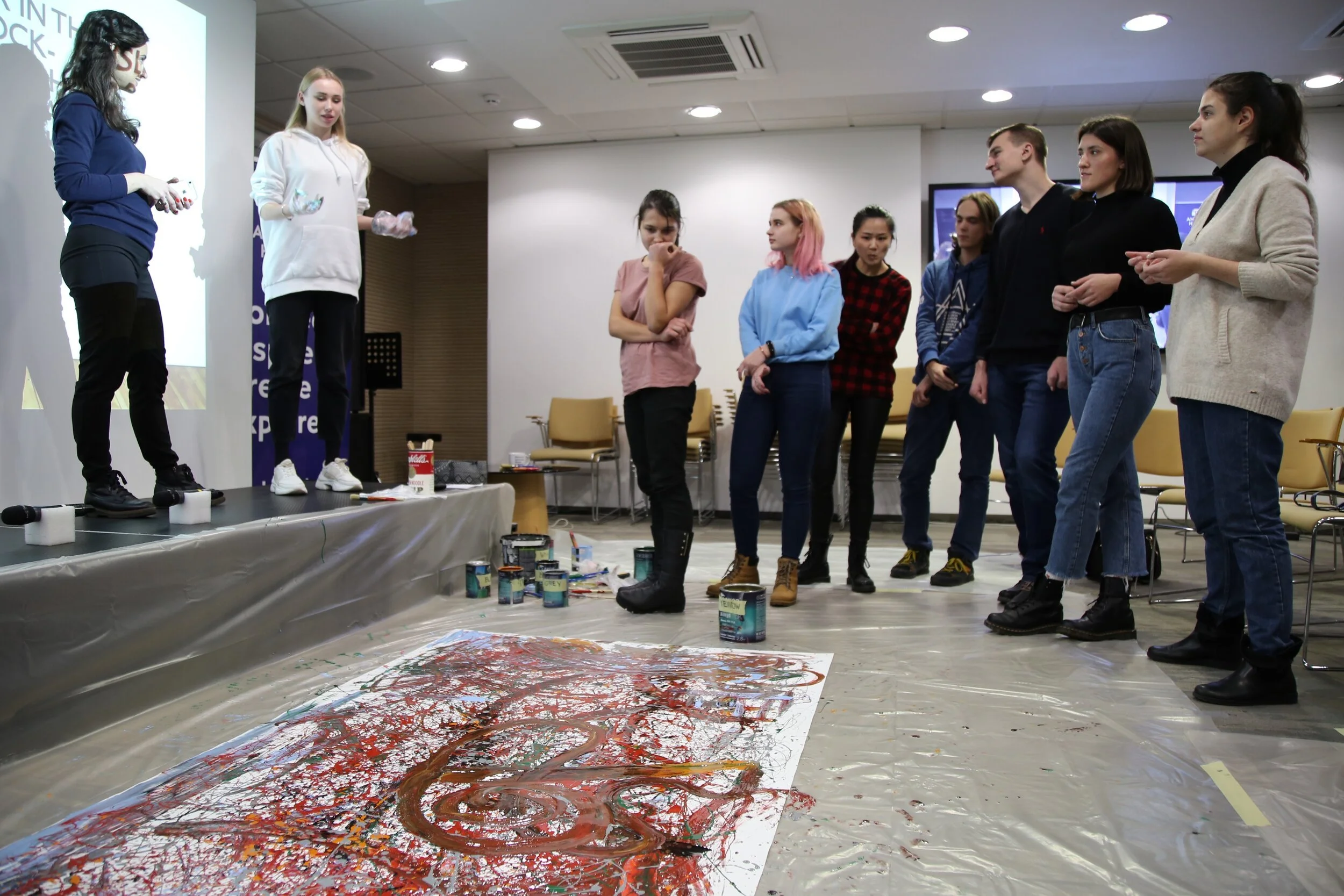Success is doing something that makes you happy
“Success is doing something that makes you happy and contributes positively to society and the greater good”
The U.S. government is an enormous and complex institution. It relies on the dedication and hard work of both federal and civil servants who work in many different agencies and fields, ranging from health and economics to immigration, national security, and agriculture. The U.S. Foreign Service (FS) is a particularly critical component of the U.S. government. Operating within the Department of State, it plays an important role in promoting positive diplomatic ties between foreign countries and America. There are five major career tracks in the FS: consular, economic, management, political, and public relations. FS Officers mainly work within embassies and consulates and are employed with a wide range of tasks, from issuing visas to hosting events that foster understanding between the local population and the U.S. Read below to get to know one FS Officer currently working at the U.S. embassy Kyiv, Ilona Aleksandrova!
Bianca: In 1-2 sentences, introduce yourself and tell us what you do presently.
Ilona: My name is Ilona Aleksandrova and I currently work at the U.S. Embassy Kyiv as the Assistant Press Attaché. The Embassy’s Press Office works with media to highlight the U.S. – Ukraine partnership in support of a free, prosperous and democratic Ukraine. We also manage very active social media accounts on Facebook (U.S. Embassy Kyiv Ukraine), Twitter (@USEmbassyKyiv) and Instagram (@usembkyiv), which I encourage those interested to follow. Among other things, you will often find livestreams on our Facebook featuring entrepreneurs, academics, and other interesting individuals from whom you can learn quite a bit. We frequently host online trivia and raffles, create special videos, and highlight American culture on our Instagram.
Bianca: Did you always know you wanted to join the U.S. State Department’s diplomatic service to become a Foreign Service Officer? If so, why? If not, what initially drew you to this career?
Ilona: The Foreign Service had been on my radar since college, but I wanted to first live in New York City, work in the nonprofit sector, and try different things. After several years of working in NYC, I spent a wonderful year freelancing as a nonprofit management consultant, which gave me time to think about what I wanted to do next. I had done work of a public service nature throughout most of my career, and I knew that joining the Foreign Service would allow me to serve my country by helping strengthen our relationships with other nations. In Ukraine, I am grateful to work on managing projects that help journalists counter Russian disinformation and create an open dialogue regarding issues like rule of law and free elections.
Bianca: When applying to become a Foreign Service Officer, which past skills and/or experiences did you believe made you the strongest candidate?
Ilona: The Foreign Service is not just a career, it is also a lifestyle because you move around every few years and are assigned to often very distinct jobs. Every time you move, you have to make new friends, work to gain trust from your colleagues, and prove that you can do the job well. By the time I applied to the Foreign Service, I had held a number of different positions in the nonprofit and private sectors. I had traveled all over the world, and I had lived and studied in various places both in the United States and abroad. I also had a good sense of my strengths and weaknesses, which is important in a career that bounces you around the world and into and out of different kinds of jobs. I realized I was ready for and interested in both the professional aspect of the work, which is obviously critical, and the unique lifestyle, which is not for everyone.
Bianca: Describe a project, big or small, that you’ve undertaken as a Foreign Service Officer that made you feel accomplished.
Ilona: The U.S. Embassy runs a number of press-related grant programs and I oversee several of them. For instance, we have a Media Cooperative program that allows journalists to apply for funding to travel to the United States for reporting projects. In addition to funding, we provide logistical support and help the journalists set up interviews and travel arrangements. That way, the journalists can focus solely on getting their stories. We usually put out a call for proposals once per year. Through our European Press Tours, we assist journalists who wish to travel from other parts of Europe to Ukraine to meet with politicians, activists, civil society representatives, and others to learn firsthand what is happening politically, socially, and economically in Ukraine. We find that creating more opportunities for journalists from across Europe to see and experience the Ukrainian reality is an important way of fighting disinformation. There are many other grant programs as well, and I encourage anyone interested to regularly check the U.S. Embassy’s website.
Bianca: Tell us about an influential mentor you have had (or presently have). In your opinion, what qualities make a good mentor?
Ilona: I have a friend who also happens to be a career coach. I trust her opinion because she is not at all judgmental but will call me out when she thinks I am wrong about something. She helps me work through questions or issues I might have by referencing personality traits based on tests she has me take. This makes our discussions feel less subjective. Mainly, though, she is my cheerleader and sometimes that is exactly what anyone needs.
Bianca: Tell me about a pivotal moment in your career.
Ilona: I recently moderated virtual discussion sessions as part of an English for Journalists course organized by America House. I was struck by how dedicated and committed the participants, most of whom were working journalists, were to empowering their audiences with complete and correct information. There was so much energy and passion in the discussions, I felt inspired. On that note, for those interested, here’s a link to a Facebook live chat with representatives from the U.S. Embassy, the UK Embassy, and the Ukrainian Ministry of Education discussing the Learn to Discern program, which addresses issues of media literacy
Bianca: How do you measure your own success?
Ilona: Success is relative, but I think we live in a world that idolizes the idea of “success” as judged by others. For me, success is doing something that makes you happy and contributes positively to society and the greater good. I take particular satisfaction from my work, specifically from seeing the impact of the programs I run on individual Ukrainians and on Ukrainian society as a whole. Building lasting relationships with Ukrainians that I plan to maintain throughout my life has also brought me a lot of happiness.
Bianca: Given that you are multilingual, what role has your knowledge of different languages played in your career?
Ilona: Knowing other languages opens doors, even if it is just to meet and communicate with new people. It also helps you attain a broader perspective of the world. I speak Russian, which allows me to follow the news in Ukraine and understand journalists, for instance, who may not speak English. I understand some Ukrainian too. My next assignment is in Bolivia where I will use my Spanish skills while working on cultural programs. Actually, now is the perfect time to work on your language skills. For anyone trying to improve their English language skills, the U.S. Embassy’s Regional English Language Office compiled a list of helpful and free resources.
Bianca: What do you like to do in your free time?
Ilona: I love to scrapbook and make albums of photographs from my various travels. I enjoy looking through my albums every once in a while to remember and appreciate the wonderful experiences I have been lucky enough to have. I also love yoga and dancing salsa and bachata. I started taking fly yoga classes prior to the quarantine, and it was a lot of fun and great for strength building. Now, I’m enjoying the online options from the comfort of my home.
Bianca: What is a hidden talent you have?
Ilona: I pride myself on being able to put together travel suggestions and itineraries for people based on what I think they would enjoy. I’m going to throw modesty to the wind and say that I tend to be spot on with my recommendations.
Bianca: I noticed that you have a master’s degree in Art History. What inspired you to conduct research on cultural heritage?
Ilona: After my undergraduate studies, I thought I wanted to be a lawyer who focused on art law, specifically issues of cultural property and repatriation. I wanted to explore the meaning societies give to objects, and how these objects can become so important to cultural identity. Oddly, my master’s degree also made me recognize that I did not, in fact, want to become a lawyer. I was lucky to have exceptional mentors who were both Ph.D.’s in archeology as well as law professors. They made me realize, in the most supportive and realistic way, that if I go to law school, I should want to be a lawyer and not a specific kind of lawyer. That was not going to work for me. The State Department has a program called the U.S. Ambassadors Fund for Cultural Preservation, which I enjoy working on whenever possible. Through this program, the U.S. government has funded the preservation of various notable Ukrainian cultural properties like the Drohobychchyna Museum, Vyshnivets Palace, and the Black House in Lviv’s Rynok Square. My team produced a video to explain why the U.S. supports these efforts and the video also offers an explanation about my own interest in cultural property. Here’s a link if you are curious/
Bianca: Describe a project, big or small, that you’ve undertaken as a Foreign Service Officer that made you feel accomplished.
Ilona: The U.S. Embassy runs a number of press-related grant programs and I oversee several of them. For instance, we have a Media Cooperative program that allows journalists to apply for funding to travel to the United States for reporting projects. In addition to funding, we provide logistical support and help the journalists set up interviews and travel arrangements. That way, the journalists can focus solely on getting their stories. We usually put out a call for proposals once per year. Through our European Press Tours, we assist journalists who wish to travel from other parts of Europe to Ukraine to meet with politicians, activists, civil society representatives, and others to learn firsthand what is happening politically, socially, and economically in Ukraine. We find that creating more opportunities for journalists from across Europe to see and experience the Ukrainian reality is an important way of fighting disinformation. There are many other grant programs as well, and I encourage anyone interested to regularly check the U.S. Embassy’s website.
Bianca: Tell us about an influential mentor you have had (or presently have). In your opinion, what qualities make a good mentor?
Ilona: I have a friend who also happens to be a career coach. I trust her opinion because she is not at all judgmental but will call me out when she thinks I am wrong about something. She helps me work through questions or issues I might have by referencing personality traits based on tests she has me take. This makes our discussions feel less subjective. Mainly, though, she is my cheerleader and sometimes that is exactly what anyone needs.
Bianca: Tell me about a pivotal moment in your career.
Ilona: I recently moderated virtual discussion sessions as part of an English for Journalists course organized by America House. I was struck by how dedicated and committed the participants, most of whom were working journalists, were to empowering their audiences with complete and correct information. There was so much energy and passion in the discussions, I felt inspired. On that note, for those interested, here’s a link to a Facebook live chat with representatives from the U.S. Embassy, the UK Embassy, and the Ukrainian Ministry of Education discussing the Learn to Discern program, which addresses issues of media literacy
Bianca: How do you measure your own success?
Ilona: Success is relative, but I think we live in a world that idolizes the idea of “success” as judged by others. For me, success is doing something that makes you happy and contributes positively to society and the greater good. I take particular satisfaction from my work, specifically from seeing the impact of the programs I run on individual Ukrainians and on Ukrainian society as a whole. Building lasting relationships with Ukrainians that I plan to maintain throughout my life has also brought me a lot of happiness.
Bianca: Given that you are multilingual, what role has your knowledge of different languages played in your career?
Ilona: Knowing other languages opens doors, even if it is just to meet and communicate with new people. It also helps you attain a broader perspective of the world. I speak Russian, which allows me to follow the news in Ukraine and understand journalists, for instance, who may not speak English. I understand some Ukrainian too. My next assignment is in Bolivia where I will use my Spanish skills while working on cultural programs. Actually, now is the perfect time to work on your language skills. For anyone trying to improve their English language skills, the U.S. Embassy’s Regional English Language Office compiled a list of helpful and free resources.
Bianca: What do you like to do in your free time?
Ilona: I love to scrapbook and make albums of photographs from my various travels. I enjoy looking through my albums every once in a while to remember and appreciate the wonderful experiences I have been lucky enough to have. I also love yoga and dancing salsa and bachata. I started taking fly yoga classes prior to the quarantine, and it was a lot of fun and great for strength building. Now, I’m enjoying the online options from the comfort of my home.
Bianca: What is a hidden talent you have?
Ilona: I pride myself on being able to put together travel suggestions and itineraries for people based on what I think they would enjoy. I’m going to throw modesty to the wind and say that I tend to be spot on with my recommendations.
Bianca: I noticed that you have a master’s degree in Art History. What inspired you to conduct research on cultural heritage?
Ilona: After my undergraduate studies, I thought I wanted to be a lawyer who focused on art law, specifically issues of cultural property and repatriation. I wanted to explore the meaning societies give to objects, and how these objects can become so important to cultural identity. Oddly, my master’s degree also made me recognize that I did not, in fact, want to become a lawyer. I was lucky to have exceptional mentors who were both Ph.D.’s in archeology as well as law professors. They made me realize, in the most supportive and realistic way, that if I go to law school, I should want to be a lawyer and not a specific kind of lawyer. That was not going to work for me. The State Department has a program called the U.S. Ambassadors Fund for Cultural Preservation, which I enjoy working on whenever possible. Through this program, the U.S. government has funded the preservation of various notable Ukrainian cultural properties like the Drohobychchyna Museum, Vyshnivets Palace, and the Black House in Lviv’s Rynok Square. My team produced a video to explain why the U.S. supports these efforts and the video also offers an explanation about my own interest in cultural property. Here’s a link if you are curious.
Vocabulary:
On my radar (idiom): something that you pay attention to and consider to be important
Freelancing (v.): working for different companies at one time instead of being permanently employed at just a single company
Solely (adj.): only
Cheerleader (n.): someone that cheers you on and encourages you
Struck (v.): impressed, blown away
Spot on (adj.): exactly right
Repatriation (n.): the process of returning something (or someone) to its home county
ABOUT THE AUTHOR
A Texas native, Bianca Navia is currently in her senior year at Arizona State University pursuing a dual major in Political Science and Global Studies. She is most passionate about international affairs, diplomacy, foreign languages, traveling, and teaching. A fun fact about her? She’s the oldest of four sisters in a big Cuban-Italian-American family!





